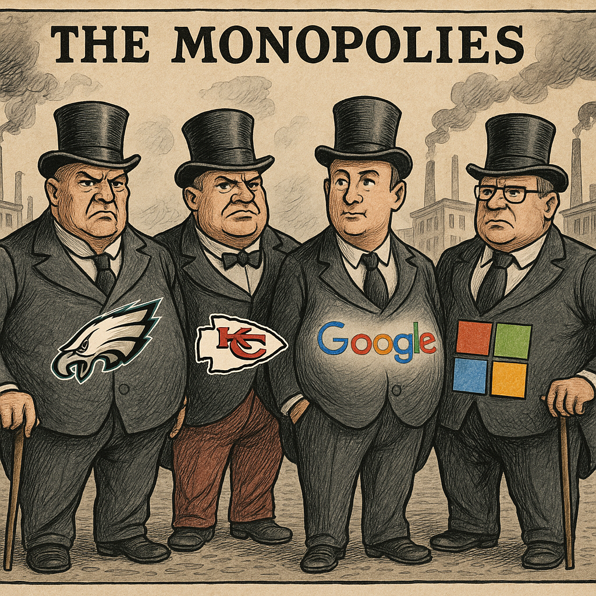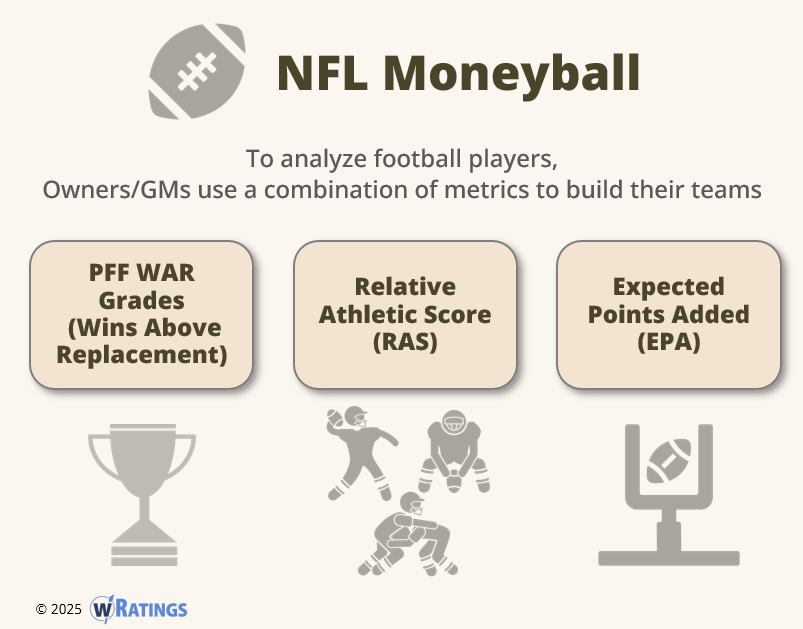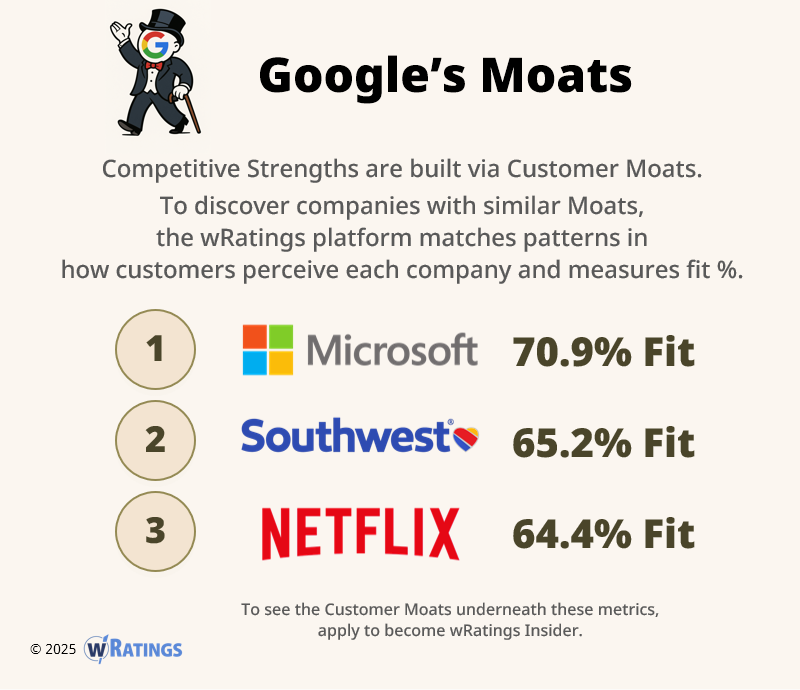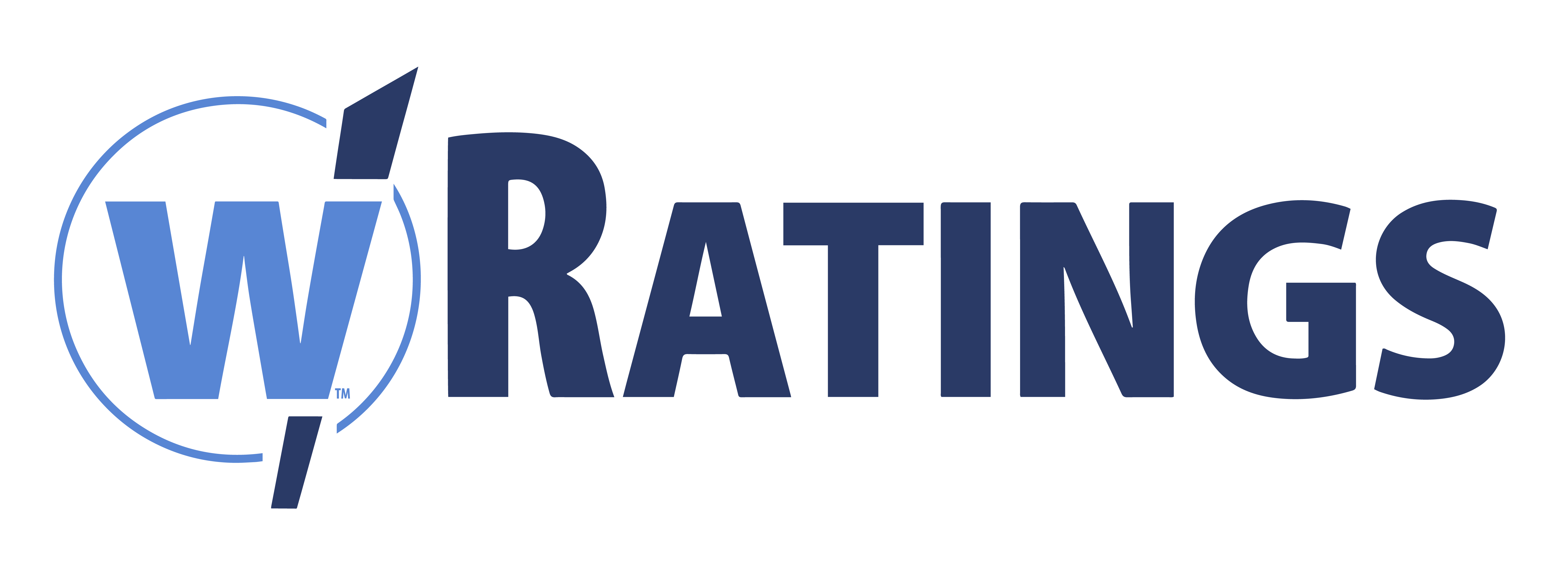NFL Draft: Monopoly Building by the Chiefs, Eagles, Google, & Microsoft
Jon Moritz
April 23, 2025
NFL Draft: Monopoly Building by the Chiefs, Eagles, Google, & Microsoft
Gary A. Williams
wRatings Founder & CEO

All trademarks are properties of their respective owners.
When the NFL Draft starts Thursday in Green Bay, Wisconsin, Owners/GMs and fans will be tuning in to see which college elite players become overnight millionaires – well, assuming they are not already millionaires with their previous NIL deals but that’s a different story for another time.
One looming question will be how many NFL teams, if any, will try to reverse engineer the success of 2025 Super Bowl Champions, the Philadelphia Eagles? Many sports teams – and companies – do their best to imitate success. But is that really the best path forward?
The Eagles didn’t copy the Kansas City Chiefs – They built their own system based on the power game to counter the Chiefs scoring machine. The Chiefs didn’t copy the New England Patriots – They built their own system of speed football to overcome the Buffalo Bills and the San Francisco 49ers (but not the Tampa Bay Buccaneers).
The fact is copycats rarely win, and they certainly don’t become dominant for years and years, whether in football or in business.
The Eagles and the Chiefs have each built their own monopolies, albeit in very different ways. Google (NASDAQ: GOOGL) and Microsoft (NASDAQ: MSFT) have as well, albeit in different ways. So how does an owner/GM or company executive create a monopoly? You must be the one that makes the new rules.
The key to building a long-term winner, whether in football or business, is to be peerless. It takes courage to be distinct and incomparable. You must challenge the status quo and come up with new rules that force rivals to follow you.
Rule-Maker: Philadelphia Eagles & Kansas City Chiefs
The game of football has shifted – quietly, subtly, and unmistakably – toward the front office where the value of the spreadsheet is just as necessary as the stopwatch (if not more so). What baseball found with metrics like on-base percentage and fielding percentage, football has found as well.
Quarterbacks aren’t just accurate anymore – they can perform “better than expected” under pressure. Linebackers aren’t just fast – they score a 9.5 on Relative Athletic Score (RAS). PFF Grades evaluate each player on every play. It’s a new world of terminology that can be confusing at first, but team building at the NFL Draft comes down to three popular metrics:
- Relative Athletic Score. RAS is a composite metric that quantifies a player’s athleticism based on their NFL Combine or Pro Day results, making it highly useful for draft day evaluations.
- PFF Grades (Pro Football Focus). PFF offers granular grading on every player on every play. The grades break down “wins above replacement” (WAR) for NFL players, similar to its Moneyball counterpart in baseball.
- Expected Points Added (EPA). EPA measures how much a player improves the team’s expected points on a given play, within the context of the game.

Several other metrics at specific positions exist such as Completion Percentage Over Expected (CPOE) for QBs as well as evaluations for Special Teams, Slot Corners, and Coverage Linebackers. “Over Expected” metrics are supposed to help separate player skill from player circumstance. Teams using these metrics often value positional surplus value, favoring high-impact positions they believe win games.
Let’s face it. NFL Moneyball can be daunting at first glance. Just ask any Fantasy Football Owner.
In the end though, one key exists to simplify it all: NFL Moneyball is not about a stat. It’s about a mindset. You must find value where others see noise. You must see patterns where others see luck. And then you must combine them into something others will find extremely difficult to reverse engineer. This is true whether you are an NFL Owner/GM or a company executive.
For the 2024 Eagles, that meant doubling down on the power game. Going against the status quo, the team signed Running Back Saquon Barkley to an offseason contract. This then complemented its strong offensive line. They also signed WRs that are bigger than most and love to block. Their defense is meant to smother teams. And their QB Jalen Hurts is the best at running the “Tush Push,” a hugely successful QB sneak that is, well, not even run as a “sneak” anymore. The Tush Push is so successful that the NFL is now looking to not allow it anymore.
In other words, the Eagles have become a monopoly.
Rule-Makers: Google & Microsoft
Although Alphabet, the parent company of Google, runs many successful businesses in areas such as artificial intelligence (AI), cloud computing, self-driving cars, and video, most people know Google as being synonymous with web search and creating the widely used Chrome web browser.
Google was founded by Larry Page and Sergey Brin in 1998 in their Silicon Valley garage. Their Google search engine was a phenomenal product on its own, but their eventual success can be arguably traced back to something well outside of their control: Breaking up a monopoly.
Just a few years after Google’s humble beginnings, the US government sued Microsoft in June 2001, accusing the company of illegally monopolizing the web browser market. They were forcing legal and technical restrictions on PC manufacturers and users to uninstall Internet Explorer (IE). Microsoft’s “rule” for using IE was broken up, providing an avenue for Google to become the dominant force it is today.

Fast forward to April 2025, and now a US District Judge says Google is liable for acquiring and maintaining power in two markets for online advertising technology. Ironically, the US antitrust prosecutors are trying to break up the company for turning its powerful, highly popular search engine into a monopoly.
As investor Peter Thiel says, “If you’re starting a company, you always want to aim for monopoly and you always want to avoid competition.” Building competitive advantages into your business is critical to long-term success.
Similar to Owners/GMs building a team at the NFL Draft, the best way to build a monopoly is to make a set of hard-to-reverse choices that, in turn, create and capture disproportionate value. It’s a mindset. You must find customer value where others see noise. You must see patterns where others don’t. And then you must combine them into something others will find extremely difficult to reverse engineer.
Google changed the way we retrieve information. They did it by assembling a series of competitive advantages in superior search algorithms, speed, and knowledge-sharing. They built multiple Customer Moats that no other company has been able to collectively breach. Some do challenge their strengths in a single area, but the combined effect is what makes Google so dominant.
When Microsoft was forced to unpack its browser as the default on PCs, Google was able to attack and build a durable advantage in a new area where no large competitor existed.
Become a Rule-Maker
Let the wRatings platform show you the customer analytics where old rules in your industry have run their course (we call them Table Stakes), and new rules are ready to be made.
If you’d like access to our Moneyball analytics and benchmarking database apply to become a wRatings Insider here.
© 1999-2025 wRatings. All rights reserved / Privacy Policy


